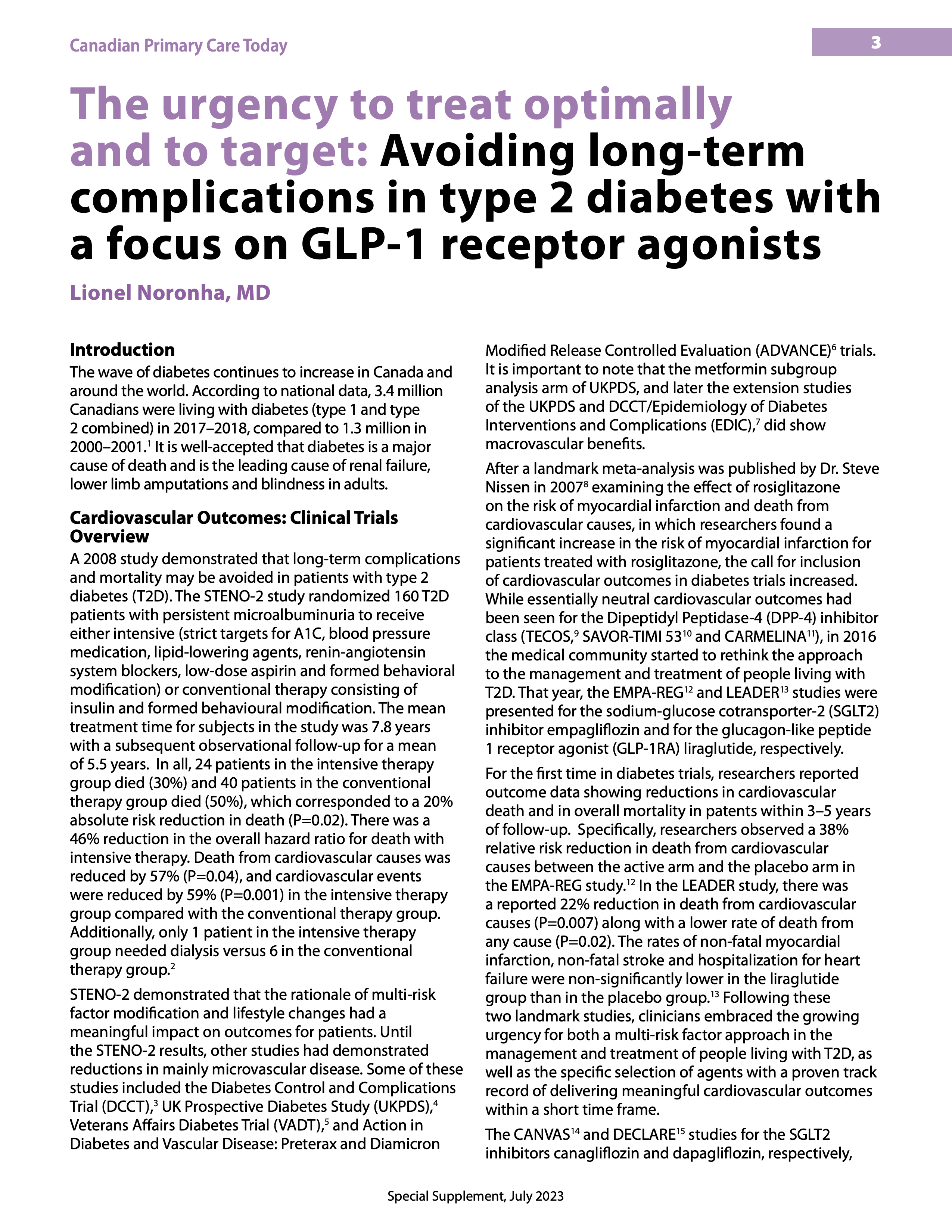The urgency to treat optimally and to target: Avoiding long-term complications in type 2 diabetes with a focus on GLP-1 receptor agonists
DOI:
https://doi.org/10.58931/cpct.2023.1S0717Abstract
The wave of diabetes continues to increase in Canada and around the world. According to national data, 3.4 million Canadians were living with diabetes (type 1 and type 2 combined) in 2017–2018, compared to 1.3 million in 2000–2001. It is well-accepted that diabetes is a major cause of death and is the leading cause of renal failure, lower limb amputations and blindness in adults.
References
Public Health Agency of Canada. Canadian Chronic Disease Surveillance System (CCDSS) [Internet]. Public Health Agency of Canada. 2017 [accessed 2019 Sept 2013].
Gaede P, Lund-Andersen H, Parving H-H, Pedersen O. Effect of a multifactorial intervention on mortality in type 2 diabetes. N Engl J Med. 2008 Feb 7;358(6):580-591. DOI: https://doi.org/10.1056/NEJMoa0706245
DCCT Research Group. Diabetes control and complications trial (DCCT): update. Diabetes Care.1990:427-433. DOI: https://doi.org/10.2337/diacare.13.4.427
King P, Peacock I, Donnelly R. The UK Prospective Diabetes Study (UKPDS): clinical and therapeutic implications for type 2 diabetes. Br J Clin Pharmcol. 1999:48(5):643. DOI: https://doi.org/10.1046/j.1365-2125.1999.00092.x
Duckworth W, et al. Glucose control and vascular complications in veterans with type 2 diabetes. N Engl J Med 2009:360;2:129-139. DOI: https://doi.org/10.1056/NEJMoa0808431
ADVANCE Collaborative Group. Intensive blood glucose control and vascular outcomes in patients with type 2 diabetes. N Engl J Med. 2008:358(24):2560-2572. DOI: https://doi.org/10.1056/NEJMoa0802987
Diabetes Control and Complications Trial/Epidemiology of Diabetes Interventions and Complications (DCCT/EDIC) Study Research Group. Intensive diabetes treatment and cardiovascular disease in patients with type 1 diabetes. N Engl J Med. 2005:353(25): 2643-2653. DOI: https://doi.org/10.1056/NEJMoa052187
Nissen SE, Wolski K. Effect of rosiglitazone on the risk of myocardial infarction and death from cardiovascular causes. N Engl J Med. 2007:356(24):2457-2471. DOI: https://doi.org/10.1056/NEJMoa072761
Green JB, et al. Effect of sitagliptin on cardiovascular outcomes in type 2 diabetes. N Engl J Med. 2015:373(3):232-242. DOI: https://doi.org/10.1056/NEJMoa1501352
Scirica BM, et al. Saxagliptin and cardiovascular outcomes in patients with type 2 diabetes mellitus. N Engl J Med. 2013:369(14):1317-1326. DOI: https://doi.org/10.1056/NEJMoa1307684
Rosenstock J, et al. Effect of linagliptin vs placebo on major cardiovascular events in adults with type 2 diabetes and high cardiovascular and renal risk: the CARMELINA randomized clinical trial. JAMA. 2019:321(1):69-79. DOI: https://doi.org/10.1001/jama.2018.18269
Zinman B, et al. Empagliflozin, cardiovascular outcomes, and mortality in type 2 diabetes. N Engl J Med. 2015:373(22):2117-2128. DOI: https://doi.org/10.1056/NEJMoa1504720
Marso SP, et al. Liraglutide and cardiovascular outcomes in type 2 diabetes. N Engl J Med. 2016:375(4):311-322. DOI: https://doi.org/10.1056/NEJMoa1603827
Neal B, et al. Canagliflozin and cardiovascular and renal events in type 2 diabetes. N Engl J Med. 2017:377(7):644-657. DOI: https://doi.org/10.1056/NEJMoa1611925
Wiviott SD, et al. Dapagliflozin and cardiovascular outcomes in type 2 diabetes. N Engl J Med. 2019:380(4):347-357. DOI: https://doi.org/10.1056/NEJMoa1812389
Lipscombe L, et al. Pharmacologic glycemic management of type 2 diabetes in adults: 2020 update. Can J Diabetes. 2020:44(7):575-591. DOI: https://doi.org/10.1016/j.jcjd.2020.08.001
Marso SP. Oral semaglutide and cardiovascular outcomes in patients with type 2 diabetes. N Engl J Med. 2016:375:1834-1844. DOI: https://doi.org/10.1056/NEJMoa1607141
Husain, M, et al. Oral semaglutide and cardiovascular outcomes in patients with type 2 diabetes. N Engl J Med. 2019:381(9): 841-851. DOI: https://doi.org/10.1056/NEJMoa1901118
Aroda VR. Randomized clinical trial of the efficacy and safety of oral semaglutide monotherapy in comparison with placebo in patients with type 2 diabetes. Diabetes Care. 2019;4 (9):1724-1732. DOI: https://doi.org/10.2337/dc19-0749
Laiteerapong N. The legacy effect in type 2 diabetes: impact of early glycemic control on future (The Diabetes and Aging Study). Diabetes Care. 2019;42(3):416-426. DOI: https://doi.org/10.2337/dc17-1144
Lachlin JM. The beneficial effects of earlier versus later implementation of intensive therapy in type 1 diabetes. Diabetes Care. 2021:44(10):2225‑2230. DOI: https://doi.org/10.2337/dc21-1331

Downloads
Published
How to Cite
Issue
Section
License
Copyright (c) 2023 Canadian Primary Care Today

This work is licensed under a Creative Commons Attribution-NonCommercial-NoDerivatives 4.0 International License.
